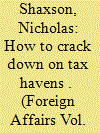|
|
|
Sort Order |
|
|
|
Items / Page
|
|
|
|
|
|
|
| Srl | Item |
| 1 |
ID:
135395


|
|
|
|
|
| Summary/Abstract |
In a speech at the Tory party conference, George Osborne, the Chancellor, roused his supporters with a claim that by 2015 Britain would have the ‘lowest, most competitive business taxes of any large country in the world’.
|
|
|
|
|
|
|
|
|
|
|
|
|
|
|
|
| 2 |
ID:
158860


|
|
|
|
|
| Summary/Abstract |
On October 17, 2008, during the throes of the global financial crisis, officials from the U.S. Department of Justice summoned Swiss banking regulators and executives from UBS, Switzerland’s largest bank, to a closed-door meeting in New York to discuss the bank’s role in helping American clients evade taxes. It was a sensitive moment: the Swiss government had bailed out UBS the previous day. The bank’s game plan was simple, a company insider later told Reuters [3]: “Admit guilt, settle the case quickly, and move on.”
|
|
|
|
|
|
|
|
|
|
|
|
|
|
|
|
| 3 |
ID:
060980


|
|
|
|
|
| Publication |
Mar 2005.
|
| Summary/Abstract |
Much attention has been given in recent years to the paradoxical fact that huge flows of money from petroleum appear not to have brought prosperity to the African countries that produce it, but may instead have helped cause poverty, economic decline and conflict. Issues such as human rights abuses near oil installations and environmental damage have often captured the headlines, but these, while important, are peripheral to the main problems: the Dutch Disease, whereby an influx of oil money causes real exchange rates to appreciate, making local industry and agriculture uncompetitive; the damage that petroleum money causes to institutions, incentives and overall governance; and the volatility of oil prices and revenues. This article will look at the volatility problem, and how oil contracts tend to make matters even worse. They are like this for long-established technical, political and historical reasons, and there is consequently a widespread belief in the industry that change is not possible. This defeatist attitude needs to be vigorously challenged.
|
|
|
|
|
|
|
|
|
|
|
|
|
|
|
|
| 4 |
ID:
079894


|
|
|
|
|
| Publication |
2007.
|
| Summary/Abstract |
Popular perceptions of corruption, poverty and the 'resource curse' in the oil-rich Gulf of Guinea can be caricatured as belonging to (or falling between) two possible positions. First, the fault lies with oil companies, exploiting, bribing and otherwise abusing innocent Africans. Second, the blame lies with corrupt African rulers, stealing the oil money. There is truth in each position, but this is now a stale, unhelpful debate, obscuring other aspects of the problem. Several themes merit more attention. First, taxation in resource-dependent states is different from what is found in other types of economy. Second, transparency and anti-corruption schemes like the Extractive Industries Transparency Initiative focus on revenue flows inside countries, ignoring crucially important transnational flows. Third, natural resources provoke competition and factional politics, fragmenting the public interest. These three lead to a fourth way of conceptualizing the issue-as a systemic one, which is not ultimately the result of bad behaviour (or even of 'culture'). We should move away from focusing too much on actors and behaviour and instead focus on systems and processes, a shift that will result in different (or additional) policy prescriptions, new (or expanded) branches of economics and political science. This article does not depend on statistical analysis but instead takes a bottom-up view, based on nearly 15 years' research into oil and politics in sub-Saharan Africa, including interviews with numerous key players, to explore the dynamics of the resource curse
|
|
|
|
|
|
|
|
|
|
|
|
|
|
|
|
|
|
|
|
|